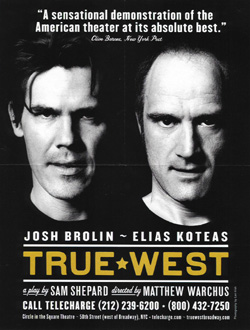By Charles Isherwood
Daily Variety Chief Theater
Critic
NEW YORK (Variety) -- It's a shame that audiences appear to be drying up for Broadway's "True West," following the exit of Philip Seymour Hoffman and John C. Reilly, the indie film stars whose bravura performances made Matthew Warchus' production the must-see show of the season.
 As
Messrs. Hoffman, Reilly and Warchus surely knew, and the production's perfectly
viable new stars Josh Brolin and Elias Koteas are continuing to prove,
Sam Shepard's inspired, blazingly funny writing is the real star here.
As
Messrs. Hoffman, Reilly and Warchus surely knew, and the production's perfectly
viable new stars Josh Brolin and Elias Koteas are continuing to prove,
Sam Shepard's inspired, blazingly funny writing is the real star here.
Shepard's play, about two brothers who turn a simmering case of sibling rivalry into a violent game of anarchic revelry, reveals sharp and affecting new aspects at each viewing.
In the current version, which features Brolin as the prepster screenwriter Austin and Koteas as the grungy drifter Lee, it's the mad preposterousness of the brothers' attempt to trade lives and livelihoods that most strongly registers.
Playing both roles, Hoffman and Reilly shared a certain softness and sensitivity beneath their brutish or buttoned-down exteriors; one sensed sympathetic, similarly wounded hearts under both brothers' skins, and this secret allegiance made it seem somehow natural that these two polar opposites should seek to merge. But Brolin and Koteas are so strikingly -- even cartoonishly -- dissimilar that Austin's drunken desire to escape his life by free-falling into his brother's deadbeat existence seems desperate to the point of lunacy, and therefore more absurdly funny.
Brolin appears as square and white as they come as Austin. His jaw and shoulders seem chiseled from granite, and when he locks his arms across his chest he looks mummified by self-consciousness. He speaks with the ingratiating placidity of a younger brother used to having to cajole his way through life, but Brolin also brings witty flourishes to his lines when Austin's passive aggression begins to flare.
When he defensively tells the taunting Lee, "I'm not afraid you'll embarrass me," Austin's accidental emphasis on "afraid" reveals that he's entirely sure Lee will embarrass him. Overall, Brolin gives a quietly assured performance that generously leaves the fireworks to his co-star.
Koteas' Lee couldn't be a more antithetical physical specimen: smeared in black grim, wiry in contrast with Austin's rectangular bulk, jumping as if on hot coals while Austin treads softly. Koteas' performance is boldly drawn, vivid and amusingly boisterous, even treading near caricature with the added absurdity of a thick Texas drawl (another trait that makes these two seem to come from entirely different universes). Koteas does, however, come close to turning his funny physical mannerisms into shtick. He can't resist eking out another laugh with a wild gesture of frustration after the first one lands.
The primary element now missing from the production is the sensitivity and depth of feeling that previously marked Warchus' interpretation of a play whose surreal and violent antics can easily obscure its deeper layers. These may be revealed as the new stars find their feet, or they may come to light when the actors switch roles, as they plan to begin doing in the coming weeks.
But even this new, more elementary "True West" stands apart as the rare -- the only? -- significant American play braving the dangerous heat of a Broadway summer.
True
West (Circle in the Square; 631 seats; $67.50 top)